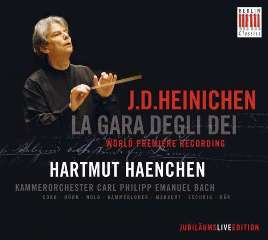Johann David Heinichen - Serenata ‘La Gara Degli Dei’ (2003)
Johann David Heinichen - Serenata ‘La Gara Degli Dei’ (2003)
(The Contest of the Gods) (Der Streit der Götter)

1 Sonata: Allegro assai 2 Qui raccolti eterni Dei 3 Dell'Imeneo, che accopia 4 Sa quella, che le fasce 5 Cintia con lieto aspetto 6 Novi eroi germania invita 7 Sì, sì, da sen fecondo 8 Dove tromba di fama ribomba 9 In favor del gran Nodo 10 Aignoto sposo in braccio 11 Con benefici 12 Di mia mano in dì sì lieto 13 Di Giove 14 In mezzo al'acque 15 De' lor diletti 16 Fia sua legge 17 Degna de' regi sposi 18 Sul volto alle belle 19 Sol varietà 20 Traggan pur da strana 21 Dalle legge comune 22 Un cor sì austero 23 Tu con volto 24 I rapidi vanni 25 All'opra 26 Non è facile il ridir 27 Di Stelle concordi Mercurio: Carola Höhn, soprano Venere: Alexandra Coku, soprano Diana: Simone Nold, soprano Marte: Annette Markert, alto Il Sole: Katharina Kammerloher, mezzo-soprano Saturno: Ralph Eschrig, tenor Giove: Olaf Bär, baritone Orchester Carl Philipp Emanuel Bach Hartmut Haenchen – conductor Live recording from november 23, 2003 of the Konzerthaus Berlin Broadcasting: December 23, 2003, DLR Berlin
Augustus I, Elector of Saxony, King of Poland, and Grand Duke of Lithuania, decided to celebrate the wedding of his son to Archduchess Maria Josepha of Austria with … well, no, not an opera after a nice, private family dinner. Augustus was an expansive monarch who believed everything he did had to be on a scale greater than all others could imagine, let alone manage. Thus there was a festival on seven successive days dedicated to six Roman gods—Jupiter, Mars, Diana, Venus, Saturn, and Mercury—framing the Sun, which could be seen in one symbolic sense as the forthcoming union. On September 2, 1719, Maria Josepha appeared in a barge traveling down the Elbe, accompanied by musicians from the Dresden court orchestra. On the 3rd, there was a Te Deum performed in the court chapel, punctuated at one point by a 330-gun salute, and afterwards, a huge banquet with musical accompaniment, followed at night by Antonio Lotti’s opera Giove in Argo . On successive days there were eight Italian and French plays, four more operas, fights to the death between animals, displays of balletic horsemanship, tilting at the ring, fireworks, more banquets, fox-throwing (at which Augustus was considered a past master), battles elaborately simulated on land and water, and at its centerpiece, the Festival of the Sun, with Heinichen’s Il gara degli dei performed for the first time after an introduction by 64 trumpeters and 8 timpanists.
As Mel Brooks would say, “Ah, it’s good to be the king.”
Under such circumstances, a slavish pastorale is only what one might expect, and Il gara degli dei delivers. Jupiter judges a series of hymns of praise to the newly married couple from each of the other gods, and more than one in some instances. The expressive limitations are apparent, as a succession of arias celebrating a single emotion have a largely ceremonial value, devoid of much character. That isn’t to say that Heinichen failed to make what he could of his situation. His arias do try to inject elements of variety—Diana’s “Cintia con lieto aspetto” is in six-eight, with recorders prominent to give it a pastoral feeling, and Mars’s “Dove Tromba” imitates the chordal intervals of trumpet calls as an indication of his martial nature. There’s some harmonic and rhythmic cleverness in several pieces, notably Saturn’s single contribution, but even Handel would have failed before this succession of single-minded musical paeans; and Heinichen, a very fine composer and good friend of the Saxon émigré, was no Handel.
The singers are a variable lot. The best are Olaf Bär, a solid, agile bass despite some aspirants in his fioritura , and Simone Nold, a lyric soprano with attractive tone and good phrasing. At the other end of the scale, Carola Höhn has trouble maintaining basic steadiness, and Alexandra Coku’s otherwise admirable Venus stumbles repeatedly over her relatively simple coloratura. Hartmut Haenchen is, as always, sensitive to his singers while leading a thoroughly disciplined performance. The CPE Bach Chamber Orchestra is a fine ensemble that utilizes all the tonal resources historically available to an orchestra of this period, from scordatura to vibrato.
While the recording is good, it should be pointed out that the enclosed libretto is in Italian and (rather pedestrian) German only, despite the presence of English liner notes. Not that you’re missing much, but those seeking an understanding in English of exactly what’s being said won’t find it here.
With reservations, then, La gara degli dei is recommended. There are many Baroque operas I’d like to hear that have never been recorded, and this was never one of them. But it has its charms, and the performance is listenable. ---FANFARE: Barry Brenesal, arkivmusic.com
download (mp3 @320 kbs):
uploaded yandex 4shared mega mediafire zalivalka cloudmailru oboom uplea








